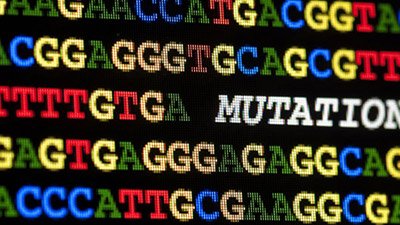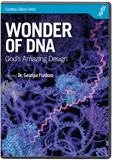Are There Beneficial Mutations?
What are beneficial mutations? Does AiG need to change its stance regarding them? Dr. Georgia Purdom, AiG–U.S., clarifies this often-contentious area.
I believe your stance on mutation is in needs to be re-evaluated. The articles I’ve been reading say that mutations are either harmful or neutral. There are, however, such things as beneficial mutations. For example, there are people with mutations in the CCR5 gene that make them virtually immune to HIV. There are also a class of cancer drugs that are 100% effective, but only in a minority of individuals that have a certain mutation. Both of these mutations could seriously improve a person’s chance of survival. I therefore fail to see what makes you think all mutations are bad?
—P.M., U.S.
Thank you for contacting Answers in Genesis. I welcome your questions to help clarify this often-contentious area of “beneficial mutations.” I’d like to comment first on your last statement.
Truth in Admission
Just read [a] recent commentary on how the Smithsonian is actively speaking against Genesis, and [I] remember how when I was a child, I cannot remember any museum (like Chicago’s Field that I haunted as a young ’un) would have [admitted] that there was evidence for a worldwide Flood 25 years ago.
Ironically, the very act of speaking out against the Flood story is the Smithsonian’s admission that the anthropological evidence for a Flood has become so strong that even they cannot ignore it. It’s great news!
I also enjoyed the claim that a Flood would leave a uniform stratum; from what I learned (at the Field and elsewhere) about geology, this is the very last thing any competent geologist would expect—that the reality of masses of material in any flood creates a number of strata of rock, sand, clay, and organic materials, not just one.
—R.P., U.S.
What about you?
Let us know how AiG has impacted your life.
I therefore fail to see what makes you think all mutations are bad?
I cannot find anywhere on our website or in our publications where we make the claim that all mutations are bad. On the contrary, we do believe that certain mutations can have beneficial outcomes, as experimental science has shown (see and Ancon Sheep: Just Another Loss Mutation). Hopefully, this will become clear in the examples that follow.
I believe your stance on mutation is in needs to be re-evaluated. The articles I've been reading say that mutations are either harmful or neutral. There are, however, such things as beneficial mutations.
It is true that the majority of mutations fall into the categories of either nearly neutral or harmful. Silent (neutral) mutations alter the DNA sequence but do not alter the amino acids encoded by the DNA sequence. This is due to built-in redundancy in the code (also referred to as degeneracy). For example, CCC, CCT, CCA, and CCG in the DNA all code for the amino acid glycine. In a hypothetical DNA sequence that has the sequence CCC if the last base is changed to any of the remaining DNA bases (T, A, or G), it will still code for the amino acid glycine. (However, there is some evidence that indicates that even these changes may not be completely neutral and may alter the stability of the mRNA, which serves as the intermediate between DNA and proteins).
My graduate work focused on studying mice that were missing three bases in their DNA and, thus, one amino acid from one protein. The mice were blind (no eyes), deaf, albino, had deficient immune systems, suffered osteopetrosis, had no teeth, and died upon weaning without supplemental nutrition. Talk about a harmful mutation! Even a small change in the DNA can cause large detrimental effects to the overall development and health of an organism.
But are there such things as beneficial mutations? In short, no, but let me explain. While I have yet to see evidence of a truly beneficial mutation, I have seen evidence of mutations with beneficial outcomes in restricted environments. Mutations are context dependent, meaning their environment determines whether the outcome of the mutation is beneficial. One well-known example is antibiotic resistance in bacteria. In an environment where antibiotics are present, mutations in the bacterial DNA that alter the target of the antibiotic allow the bacteria to survive (the bacteria are faced with a “live or die” situation). However, these same mutations come at the cost of altering a protein or system that is important for the normal functioning of the bacteria (such as nutrient acquisition). If the antibiotics are removed, typically the antibiotic resistant bacteria do not fare as well as the normal (or wild-type) bacteria whose proteins and systems are not affected by mutations (see also Is Bacterial Resistance to Antibiotics an Appropriate Example of Evolutionary Change?). There are numerous other examples as well. Thus, the benefit of any given mutation is not an independent quality, but rather a dependent quality based on the environment.
For example, there are people with mutations in the CCR5 gene that make them virtually immune to HIV. There are also a class of cancer drugs that are 100% effective, but only in a minority of individuals that have a certain mutation. Both of these mutations could seriously improve a person's chance of survival.
It is true that there are people who have mutations with beneficial outcomes. For example, individuals with the CCR5 mutation who are exposed to HIV are not likely to develop an infection and subsequently AIDS. Individuals who develop cancer but have certain mutations can be effectively treated with a certain class of cancer drugs. However, there may be currently unknown detrimental effects from these mutations as well.
For example, studies have shown that people with the CCR5 mutation may be at a higher risk of developing West Nile Virus illness and hepatitis C. In addition, the detrimental effects may not be detrimental enough to affect the overall fitness of the individual, and thus, the ability of the individuals to survive in most environments does not differ from those without the mutations. These mutations are not selected against by natural selection, and so, they remain in the population. In humans, determining the beneficial or detrimental outcomes of mutations is many times difficult to assess since the mutations do not result in a “live or die” situation as is often the case for bacteria (i.e. upon exposure to antibiotics).
The mutations only improve a person’s chance for survival in a given environment.
Again, the mutations only improve a person’s chance for survival in a given environment (external or internal), such as if the person is exposed to HIV or cancer develops within a person’s body. It is possible that the mutations would not be beneficial in other environments (i.e. if the person is exposed to West Nile Virus).
Keep in mind that beneficial, information-gaining mutations are a necessary mechanism of molecules-to-man evolution, so focusing on any potential for this is essential for evolutionists. What doesn’t seem to be often addressed is the vast amount of data to the contrary. But even if there were a clearly beneficial mutation, this would by no means “prove” the mechanism for evolution (for one thing, beneficial, information-gaining mutations would have to be a regularly occurring phenomenon and would have to “build” on previous mutations so as not to be “undone” and to keep the evolution going “uphill”), nor negate the truth of God’s revelation of His Creation in Genesis.
I hope this has helped clarify our stance on mutations and their effects.
Dr. Georgia Purdom
Further Reading
Recommended Resources

Answers in Genesis is an apologetics ministry, dedicated to helping Christians defend their faith and proclaim the good news of Jesus Christ.
- Customer Service 800.778.3390
- Available Monday–Friday | 9 AM–5 PM ET
- © 2025 Answers in Genesis





